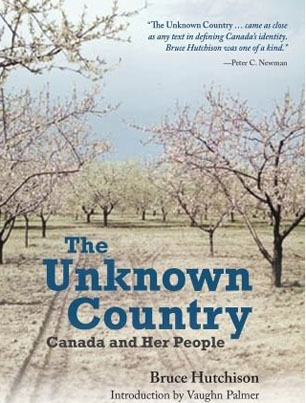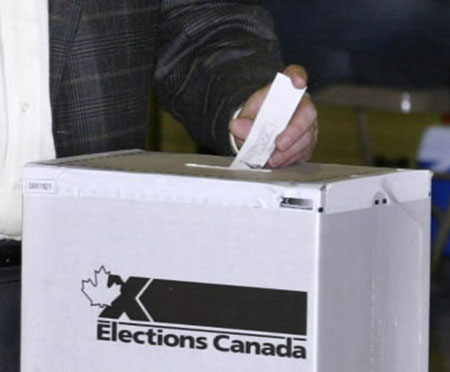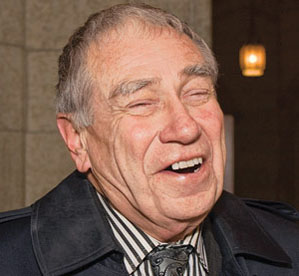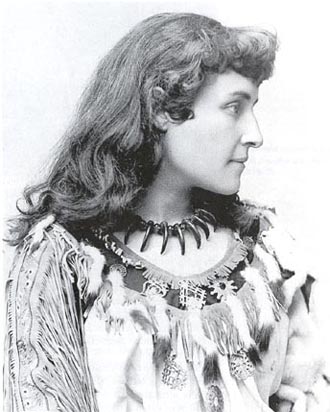Fear and hatred on the campaign trail in Canada .. is this Unknown Country about to become still more unknown?
Apr 4th, 2011 | By Counterweights Editors | Category: In Brief
The late great Bruce Hutchison’s The Unknown Country: Canada and Her People was first published in 1942. It was republished last year, with a new introduction by Vaughn Palmer of the Vancouver Sun.
At our regular Monday morning editorial meeting today one of the most senior editors drearily opined that bumping into the latest daily Nanos poll on the Canadian federal election of 2011 (“Tories enter second week with commanding 14-point lead”) called forth this distressing (and depressing) thought:
“If this poll is to be believed, the Harper Conservatives do seem on their way to an actual majority of seats in the elected branch of the Parliament of Canada – based on much less than a majority of the cross-country popular vote, of course. And nothing we do or say on this obscure website is going to make a difference!”
Another voice at the meeting said it was still far too early to give up hope. For one thing, she had just yesterday bumped into a memorable tweet from “thinking cartoonist/animator sluggin’ it out during the harper years in downtown MTL” rick thomas (aka rikipedia): “the Conservative Party of Canada : fostering fear and hatred among Canadians for a better tomorrow…what could possibly go wrong”?
It is not as if there is nothing in the media to suggest that PM Harper ought to be in more trouble than he apparently is. The Macleans site today has two pointed “questions for Stephen Harper” that underline his blatant storytelling about his own “coalition” adventures in 2004. The “latest revelations” on Bruce Carson “raise new questions about Mr. Harper’s judgment in hiring Mr. Carson as his chief policy analyst and troubleshooter” – even if Mr. Harper “says he was never told of Mr. Carson’s full criminal record.” (And our own introduction to this case, “A pretty girl is like a melody .. has Canadian election of 2011 finally arrived on back of first ever contempt of Parliament censure?, did win some fresh attention over the weekend.)
* * * *

“A recent poll found that 57 per cent of Canadian adults are ‘certain’ to vote, says Darrell Bricker, CEO of public affairs for Ipsos Reid. He says the proportion of people who respond this way tends to correspond closely to actual turnout.” According to other studies, this kind of low turnout will most likely favour the Conservatives. Photo: Patrick Price, Reuters.
And then just yesterday the latest report on the daily Nanos intelligence was headlined “Conservatives lose ground in poll.” Another report on a different compilation of recent survey research had indicated “Tory majority still out of reach despite first-week gains, polls suggest.” It is true that the Nanos results for the day before had suggested “Canada’s Conservatives gain ground in new poll.” But for her own good reasons the often savvy Chantal Hébert was nonetheless concluding: “This campaign could lead to a cliff-hanger.”
It is no doubt also a sign of something that you can put together your own vaguely amusing collections of more or less contradictory media headlines and deeper news reports. Just yesterday, eg, a Postmedia News article in the Vancouver Sun was headlined: “Low voter turnout expected in federal election ‘about nothing’.” But just a week before another Postmedia News report in the same publication had enthused: “Political ground shifts as Canadians head into exciting campaign … In the end, the verdict by Canadian voters on election night could have long-term implications for Canadian history. A Conservative majority would signify, after years of voter distrust of Harper, that the balance of power is shifting in Ottawa.”

PM Harper’s one-time “Mr. Fixit,” Bruce Carson, in happier days. Mr. Harper now says he would never have hired Mr. Carson if he had known about his “full criminal record.”
Just yesterday as well, John Ibbitson in the Globe and Mail was advising that the new Ignatieff Liberal “Family Pact” campaign platform proposes “Canada should return to its Trudeauesque past of increased social spending paid for by higher taxes on corporations and the wealthy” – an alleged stark contrast to “the Conservative emphasis on keeping taxes low while balancing the books.” On the same day Althia Raj and Mike De Souza offered a quite different-sounding characterization of the same platform document in the Vancouver Sun: “Liberals unveil election platform, plan to slash spending, increase corporate taxes … The federal Liberals will slash spending, increase taxes for the rich, encourage homeowners to make green renovations and allow citizens to vote online according to details of their election platform released Sunday.”
At the end of our editorial meeting this morning there was some consensus on the den mother’s suggestion that, whatever else, even a bare Harper majority government at last just might finally convince the various powers that be on the progressive side of the Canadian political spectrum to set aside their own petty self-interests, and seriously reorganize for the common good of the common people. And this will or at least could re-mobilize the actual decisive majority of Canadian voters, who (even in Mr. Harper’s very best poll results) continue to NOT support “the Conservative Party of Canada : fostering fear and hatred among Canadians for a better tomorrow…what could possibly go wrong”? And then Mr. Harper’s party – and its “curious attack on majority rule” in our democratic institutions – will finally get the defeat it deserves in the Canadian federal election of 2015: just in time for the 150th anniversary of the diverse Canadian confederation in 2017.

Canada’s Mohawk poetess Pauline E. Johnson, aka Tekahionwake (1861-1913), born on the Grand River Six Nations Reserve in Ontario, died in Vancouver, BC. Her grave remains in Stanley Park to this day.
Meanwhile, there are still a full four weeks to go in the campaign for the Canadian federal election of 2011. And we have also resolved not to give up all hope just yet. This is the first federal election campaign in Canada for which we have had such a thing as a daily Nanos poll. And who knows what it will finally prove to mean – especially at the start of the second week of a five-week campaign. We will continue to hope passionately for a more authentically democratic result even this time around, and do as much as we possibly can to help bring it about. (Granted, again, that is not very much: but we are trying, and working hard. And if many small voices sing as loud as they can, that will sometimes move the Rocky Mountains, and the Canadian Shield, and the beautiful Cape Breton Highlands, that go down to the edge of the sea … etc, etc, etc, etc!)
The very bottom line to our continuing concern about a Harper Conservative majority government in 2011 is that it will make the late, great Bruce Hutchinson’s The Unknown Country, Canada and Her People (first published in 1942, and just last summer released in a new edition with an introduction by Vaughn Palmer) still more unknown – even or especially to those of us who are so lucky as to live within its borders. It is part of Mr. Harper’s strategy for winning political debates, as his biographer Lawrence Martin reminded us recently, to (no doubt quite cleverly) indulge in the deft manipulation of “Smoke and mirrors. The creation of a fictional universe.” And, to indulge in some minor fearmongering of our own, we are concerned about another symposium on “Canada: The Unknown Country” – published by the American Political Science Association, to shed light among Pauline Johnson’s “Yankees to the south of us” on “the recent 2006 Canadian federal election–which saw Stephen Harper and the Conservatives dislodge the Liberal Party.” Like so many US discussions of the true north strong and free, even in the early 21st century, this 2006 symposium concluded with a canvassing of “the issues that would likely be discussed should all or part of Canada wish–however likely or unlikely this may be–to become part of the United States someday.”
